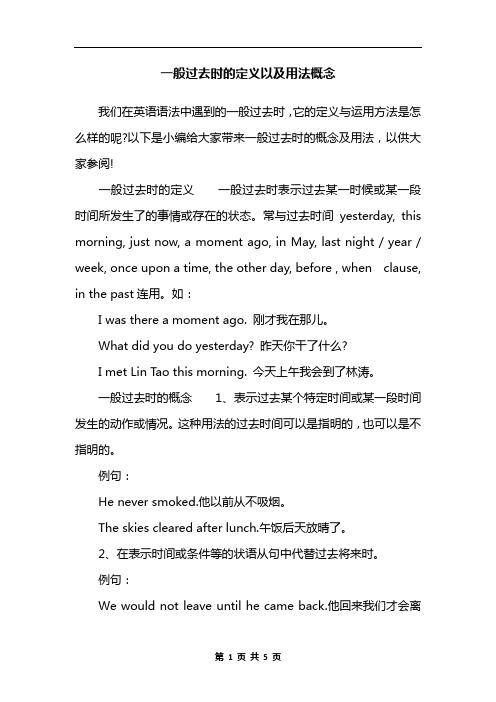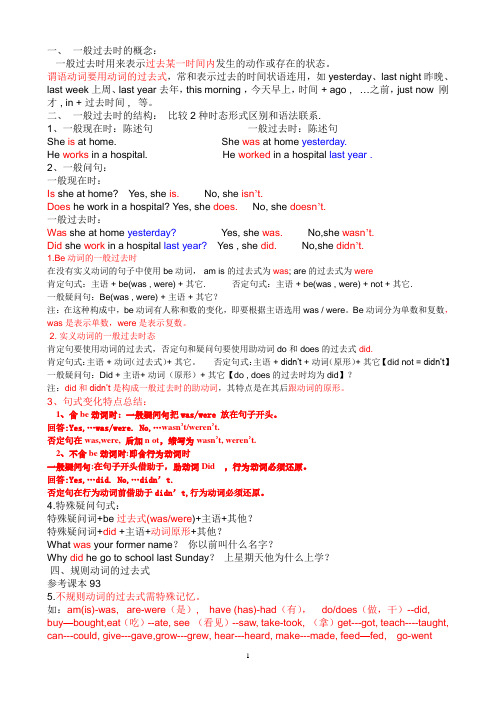一般过去时的定义以及用法概念
一般过去时

三.一般过去时(simple past tense)1.概念一般过去时表示过去某一时刻,某一段时间发生的动作或存在的状态。
一般过去时用动词的过去式表示。
2.构成一般过去时用动词的过去式表示。
be的过去式有was,were两种; have 的过去式是had;规则动词的过去式在动词词尾加-ed,具体构成规则如下:1)一般情况,动词后加ed,例词work-worked,clean-cleaned,play-played,wash-washed2)以不发音的e结尾,-d,例词live-lived,move-moved,hope-hoped,arrive-arrived 3)以辅音字母+y结尾,变y为 i再加-ed,例词study-studied,carry-carried,cry-cried,identify-identified 4)以辅音字母结尾的重读闭音节,双写最后一个辅音字母加-ed,例词plan-plannedstop-stopped,beg-begged,grab-grabbed 3.用法 (1) 表示发生在过去的动作或存在的状态。
如:He went shopping with his friends last week.They arrived ten minutes ago.He became a hotel manager ten years ago.Did you go to the concert last night?(2) 表示在过去经常发生的动作或习惯动作。
如:He visited his grandparents once a month last year.She usually went to work by car last year.When I was at school, I always went to school by bus.4.如何识别一般过去时常见的标志词有:1). yesterday, the day before yesterday.2). last week / year / month / term …(简称last系列)3). two hours ago, three years ago, a moment ago…(简称ago系列)4). in / on + 过去的年/月/日,如 in 1999, on April, 20055). just now, once upon a time, one day…5.易错点例析:(1)——Your phone number again? I _________ quite catch it.——It’s 4331577A. didn’tB. couldn’tC. don’tD. can’t(2)——Mr. Smith isn’t coming tonight.——But he _________.A. promisesB. promisedC. will promiseD. had promised(3) ——Hey, look where you are going!——Oh, I’m terribly sorry. _________.A. I’m not noticingB. I wasn’t noticingC. I haven’t noticedD. I don’t notice(4) ——Oh it’s you ! I _________ you.——I’ve had my hai r cut.A. didn’t realizeB. haven’t realizedC. didn’t recognizeD. don’t recognized(5) ——Since you’ve agreed to go, why aren’t you getting ready?——But I _________ that you would have me start at once.A. don’t realizeB. didn’t realizeC. hadn’t realizedD. haven’t realized(6) ——It’s twelve o’clock, I think I must be off now.——Oh, really? I _________ it at all.A. don’t realizeB. haven’t realizedC. didn’t realizeD. hadn’t realizedKey:ABBCBC6.中考真题及模拟(2009朝阳区一模)He went into his room, _______ the light and began to work.A. has turned onB. will turn onC. turns onD. turned on(2009海淀一模)——What’s the best food have you had in Beijing, Alex?——Roast duck! I _________to a famous restaurant to have it last week.A. have goneB. goC. will goD. went(2009宣武区一模)——Do you know how many gold medals the 23-year-old Michael Phelps _____________at the 2008 Summer Olympic Games?——Eight.A. winB. winsC. wonD. has won(2008北京)We were in Qingdao last week and __________ great fun there.A. will haveB. have hadC. hadD. have(2007北京)——What did you do after school yesterday?——I _________basketball with my friends.A. playB. playedC. will playD. am playing(2005北京)---Hi, Kate. You look tired. What’s the matter?---I ______well last night.A. didn’t sleepB. don’t sleepC. haven’t sleptD. won’t sleep (2008四川泸州)Yesterday,Tony’s family _________ a good time.A. hasB. haveC. had(2007湖南湘潭)I’m sorry you’ve missed the train. It _______10 minutes ago.A. leftB. has leftC. had left(2007福州)——Mr Green, __________you________ Three Lanes and Alleys(三坊七巷)last Sunday?——No, but I’ll visit them next week.A. will; go toB. have; been toC. did; go toD. have; gone to (2007浙江)——What did the teacher say just now?——He __________us not to play computer games all day.A. tellsB. toldC. has toldD. is told(2007江西)——Inventors have changed the way we live.——So they are famous for the great things they _________.A. doB. didC. are doingD. had done(06江西)——Where’s the cake I made this morning?——We _______ it, mum. Can you make another one for us?A. ateB. eatC. will itD. were eating。
一般过去时的定义以及用法概念

一般过去时的定义以及用法概念我们在英语语法中遇到的一般过去时,它的定义与运用方法是怎么样的呢?以下是小编给大家带来一般过去时的概念及用法,以供大家参阅!一般过去时的定义一般过去时表示过去某一时候或某一段时间所发生了的事情或存在的状态。
常与过去时间yesterday, this morning, just now, a moment ago, in May, last night / year / week, once upon a time, the other day, before , when clause, in the past连用。
如:I was there a moment ago. 刚才我在那儿。
What did you do yesterday? 昨天你干了什么?I met Lin Tao this morning. 今天上午我会到了林涛。
一般过去时的概念1、表示过去某个特定时间或某一段时间发生的动作或情况。
这种用法的过去时间可以是指明的,也可以是不指明的。
例句:He never smoked.他以前从不吸烟。
The skies cleared after lunch.午饭后天放晴了。
2、在表示时间或条件等的状语从句中代替过去将来时。
例句:We would not leave until he came back.他回来我们才会离开。
I didnt go to the party that evening as I started the next day.那天晚上我没有去参加聚会,因为我第二天就要出发。
3、表示现在时间。
这种用法使句子在语气上较为婉转客气,能这样用的动词为数不多,如:hope,wish,want,wonder,think,intend 等。
例句:I hoped you would come and have dinner with us.我希望你能来和我们一起吃饭。
(完整版)一般过去时的概念及用法

一般过去时的概念及用法一、基本概念一般过去时(simple past tense)表示过去某个时间里发生的非持续性动作或存在的状态,也表示经常或反复发生的动作。
用动词的过去式表示,常和表示过去的时间状语连用,如:yesterday,last night,in 1990,two days ago,before,the age of等。
一般过去时也表示过去经常或反复发生的动作,常和often,always等表示频率的时间状语连用。
表示过去习惯性、经常性的动作、行为;过去主语所具备的能力和性格。
二、动词变化1.直接加ed: work—- worked look——looked2.以不发音e结尾的单词,直接加d: live ——lived hope-—hoped use——used3.以辅音字母+y结尾的,变y为i加ed: study——studied carry—-carried worry--worried 4.以一个辅音字母结尾的,双写最后的辅音字母+ed: stop—— stopped plan-—planned重读闭音节体现形式为辅-元-辅结构,例如nod, n为辅音,o为元音,d为辅音。
5。
以ic结尾的动词,要把ic变成ick再加ed,如picnic→picnicked,traffic→traffic ked 6.不规则变化的动词过去式:have---had are-—-were get-—-got say--—said feel——-felt do/does———did is---was go—--went drink——drank eat—-ate bring-———brought think-—--thought buy----bought catch--—- caught teach ---—taught sit-———sat wear—--—wore cut———-cut sweep----swept sleep-—slept see--——saw become-—-—became read-—read7.以辅元辅结尾的加d三、用法(1)一般过去时表示在过去某个特定时间发生,也可以表示过去习惯性、经常性的动作.一般不强调动作的影响,只说明的事情。
一般过去时的用法和表示方式

一般过去时的用法和表示方式一般过去时是英语中最常用的过去时态,用来表示已经发生或完成的动作、事件或状态。
本文将详细介绍一般过去时的用法和表示方式。
I. 一般过去时的定义一般过去时用于描述过去某个特定时间发生的动作或状态。
它与现在无关,强调的是过去的事实或经历。
II. 一般过去时的构成一般过去时的肯定句句式为:主语 + 动词过去式 + 其他成分。
例如:1. I went to the store yesterday.2. She played soccer with her friends last weekend.3. They studied English for three hours yesterday.否定句句式为:主语 + did not/didn't + 动词原形 + 其他成分。
例如:1. I didn't go to the store yesterday.2. She didn't play soccer with her friends last weekend.3. They didn't study English for three hours yesterday.疑问句句式为:Did + 主语 + 动词原形 + 其他成分?例如:1. Did you go to the store yesterday?2. Did she play soccer with her friends last weekend?3. Did they study English for three hours yesterday?III. 一般过去时的表示方式1. 定时或时间状语词一般过去时中常常与表示过去时间的词语或短语一起使用,如yesterday(昨天)、last night(昨晚)、in 1999(在1999年)等。
这些时间状语词能够帮助准确表达动作或事件发生的具体时间。
一般过去时定义,结构,标志词,用法

一般过去时定义,结构,标志词,用法一般过去时是英语中最基本的过去时态之一,它用于描述过去发生的动作或状态。
本文将介绍一般过去时的定义、结构、标志词和用法。
一、定义一般过去时是指发生在过去的动作或状态,不考虑其持续时间或是否已经完成。
它用于描述已经结束的事情,通常与表示过去的时间短语一起使用。
二、结构一般过去时的结构很简单,主要由动词的过去式构成。
对于大多数动词,过去式是在动词原形后加上-ed,如walked,talked,played 等。
但是,有一些动词的过去式是不规则的,需要记忆,如go的过去式是went,eat的过去式是ate等。
另外,一般过去时的肯定句结构为:主语 + 动词过去式 + 其他。
如:I walked to the park yesterday.(我昨天走到了公园。
)否定句的结构为:主语 + did not + 动词原形 + 其他。
如:I did not walk to the park yesterday.(我昨天没有走到公园。
)疑问句的结构为:Did + 主语 + 动词原形 + 其他?如:Did you walk to the park yesterday?(你昨天走到了公园吗?)三、标志词一般过去时的标志词有很多,其中最常见的有以下几种:1. 表示过去的时间短语,如yesterday(昨天)、last week(上个星期)、in 1999(在1999年)等。
2. 过去式的动词,如walked(走)、talked(谈话)、played(玩)等。
3. 过去式的助动词did,如did not(没做)、did you(你做了吗?)等。
四、用法一般过去时通常用于以下情况:1. 描述过去的事件或状态,如:I went to the park yesterday.(我昨天去了公园。
)2. 描述过去的习惯或经常性动作,如:When I was a child, I played with dolls every day.(我小时候每天都和玩偶玩。
一般过去时的构成及用法

一般过去时的构成及用法:一、一般过去时的概念和用法:1. 表示过去的动作或状态,常和明确的过去时间状语连用,如:yesterday, last week, threedays ago, in 1998,just now等连用。
2. 也可以表示过去某一段时间内经常或反复出现的动作。
句子中常带有every day, often,usually, always, sometimes等时间状语。
二、一般过去时的结构:1、主语+was/were+表语.a.肯定句:主语+was/were+表语.b.否定句:主语+was/were+not+表语.c.一般疑问句:Was I / he/ she/ it/ 人名...? Yes, I/ he/ she /it/ 人名+was. No, I/ he/ she/ it/人名+wasn’t.Were we/ you/ they...? Yes, we/ you /they were. No, we/ you/ they weren’t.2、主语+行为动词+谓语。
a.肯定句:I /He/She/It/ We/You/They studied…b.否定句:I/ He /She/It/ We /You/They did not study…c.一般疑问句:Did he/she/ it/ we/you/ they study..?Yes,you did. / No,you didn’t.三、动词过去式的构成:1. 含有be动词的:am, is 变成wasare 变成were2.含有行为动词的:(1)规则动词过去式的构成有四条规则:①一般在动词原形末尾直接加上-ed。
如:look-looked。
②以不发音的字母e结尾的动词,去e再加-ed。
如:live-lived。
③以辅元辅结尾的,先双写末尾这个辅音字母,再加-ed。
如:stop-stopped。
④末尾是辅音字母+y结尾的动词,先变y为i,然后再加-ed。
一般过去时的使用范围

一般过去时的使用范围摘要:一、一般过去时的定义与应用场景二、一般过去时的使用范围1.动作或状态发生在过去某个具体时间2.描述过去习惯性动作或状态3.转述他人过去的经历或陈述事实4.表达过去某个时间点的客观事实正文:一般过去时(Simple Past Tense)是英语中的一种时态,表示过去某个时间发生的动作或存在的状态。
它在日常交流、书面表达等各种场景中都有广泛的应用。
下面我们来详细了解一下一般过去时的使用范围。
1.动作或状态发生在过去某个具体时间一般过去时可以用来描述过去某个具体时间点发生的动作或状态。
例如:- I watched a movie yesterday.(我昨天看了一部电影。
)- She visited her grandparents last week.(她上周拜访了她的祖父母。
)2.描述过去习惯性动作或状态一般过去时还可以表示过去某个时间段内经常发生的动作或存在的状态。
例如:- He usually went to the gym after work.(他下班后通常去健身房。
)- She was a good student in high school.(她高中时是个优秀的学生。
)3.转述他人过去的经历或陈述事实在转述他人过去的经历或陈述事实时,我们也可以使用一般过去时。
例如:- He said he had visited many countries.(他说他去过很多国家。
)- She explained that she had studied English for five years.(她解释说她学英语已经五年了。
)4.表达过去某个时间点的客观事实一般过去时还可以用来表达过去某个时间点的客观事实。
例如:- The sun rose in the east.(太阳从东方升起。
)- The plane landed safely at the airport.(飞机安全降落在机场。
一般过去时详解

一、一般过去时的概念:一般过去时用来表示过去某一时间内发生的动作或存在的状态。
谓语动词要用动词的过去式,常和表示过去的时间状语连用,如yesterday、last night昨晚、last week上周、last year去年,this morning ,今天早上,时间 + ago , …之前,just now 刚才 , in + 过去时间 , 等。
二、一般过去时的结构:比较2种时态形式区别和语法联系.1、一般现在时:陈述句一般过去时:陈述句She is at home. She was at home yesterday.He works in a hospital. He worked in a hospital last year .2、一般问句:一般现在时:Is she at home? Yes, she is.No, she isn’t.Does he work in a hospital? Yes, she does. No, she doesn’t.一般过去时:Was she at home yesterday? Yes, she was. No,she wasn’t.Did she work in a hospital last year? Yes , she did. No,she didn’t.1.Be动词的一般过去时在没有实义动词的句子中使用be动词, am is 的过去式为was; are的过去式为were肯定句式:主语 + be(was , were) + 其它. 否定句式:主语 + be(was , were) + not + 其它.一般疑问句:Be(was , were) + 主语 + 其它?注:在这种构成中,be动词有人称和数的变化,即要根据主语选用was / were。
Be动词分为单数和复数,was是表示单数,were是表示复数。
2. 实义动词的一般过去时态肯定句要使用动词的过去式,否定句和疑问句要使用助动词do和 does 的过去式 did.肯定句式:主语 + 动词(过去式)+ 其它。
- 1、下载文档前请自行甄别文档内容的完整性,平台不提供额外的编辑、内容补充、找答案等附加服务。
- 2、"仅部分预览"的文档,不可在线预览部分如存在完整性等问题,可反馈申请退款(可完整预览的文档不适用该条件!)。
- 3、如文档侵犯您的权益,请联系客服反馈,我们会尽快为您处理(人工客服工作时间:9:00-18:30)。
一般过去时的定义以及用法概念
我们在英语语法中遇到的一般过去时,它的定义与运用方法是怎么样的呢?以下是店铺给大家带来一般过去时的概念及用法,以供大家参阅!
一般过去时的定义
一般过去时表示过去某一时候或某一段时间所发生了的事情或存在的状态。
常与过去时间yesterday, this morning, just now, a moment ago, in May, last night / year / week, once upon a time, the other day, before …, when – clause, in the past连用。
如:
I was there a moment ago. 刚才我在那儿。
What did you do yesterday? 昨天你干了什么?
I met Lin Tao this morning. 今天上午我会到了林涛。
一般过去时的概念
1、表示过去某个特定时间或某一段时间发生的动作或情况。
这种用法的过去时间可以是指明的,也可以是不指明的。
例句:
He never smoked.他以前从不吸烟。
The skies cleared after lunch.午饭后天放晴了。
2、在表示时间或条件等的状语从句中代替过去将来时。
例句:
We would not leave until he came back.他回来我们才会离开。
I didn’t go to the party that evening as I started the next day.那天晚上我没有去参加聚会,因为我第二天就要出发。
3、表示现在时间。
这种用法使句子在语气上较为婉转客气,能这样用的动词为数不多,如:hope,wish,want,wonder,think,intend等。
例句:
I hoped you would come and have dinner with us.我希望你能来和我们一起吃饭。
I thought I might come and see you later this evening.我想我
可以在今晚晚些时候来见你吧。
Did you want to see me now?你现在想见我吗?
4、表示将来发生的事或过去将来发生的事。
例句:
He said that the investigation started the next day.他说调查次日开始。
She told me that school opened on the following day.她告诉我学校将在次日开学。
5、表示过去的习惯动作。
例句:
When he was in the city,he often went to the Central Supermarket.他在这座城市期间常去中央商场。
Wherever he travelled in those years,he wrote down what he saw and heard.那些年里,他每到一个地方旅行总会把所见所闻记下来。
6、表示某种感情色彩。
You asked for it!你这是自找!
Did you ever hear of such a thing?你听见过这种事吗?
一般过去时的用法
(1) 表示过去某时所发生的动作或存在的状态。
如:
Jim rang you just now. 吉姆刚才给你打了电话。
Liu Ying was in America last year. 刘英去年在美国。
(2) 表示过去经常或反复发生的动作。
常接时间副词often, usually, always, sometimes, every day / week, etc. 如:We usually played together. 我们通常一起玩。
We often went out for a walk after supper. 我们过去常在晚饭后散步。
